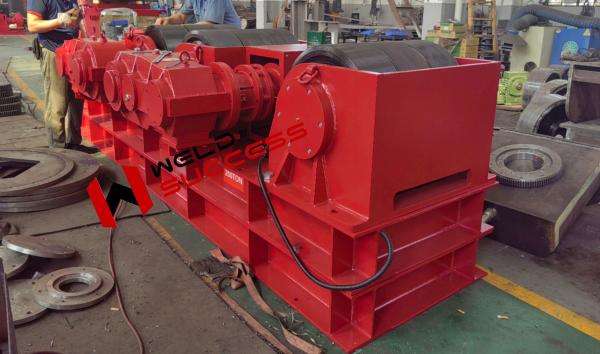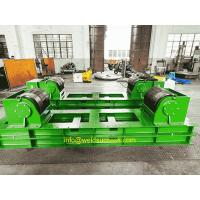200-ton conventional welding rotator is a heavy-duty piece of
equipment designed for the controlled rotation and positioning of
large workpieces weighing up to 200 metric tons (200,000 kg) during
welding operations. This equipment is essential in industries that
require the fabrication and welding of substantial components, such
as shipbuilding, oil and gas, and heavy machinery manufacturing.
Key Features and Capabilities
Load Capacity:
Supports workpieces with a maximum weight of 200 metric tons
(200,000 kg), catering to the needs of heavy-duty applications.
Conventional Rotational Mechanism:
Features a robust turntable or roller system that allows for smooth
and controlled rotation of the workpiece.
Typically powered by high-torque electric motors or hydraulic
systems to ensure reliable performance.
Precise Speed and Position Control:
Equipped with advanced control systems that allow for accurate
adjustments to the speed and position of the rotating workpiece.
Variable speed drives enable operators to customize the rotation
speed based on the specific welding task.
Stability and Rigidity:
Constructed with a heavy-duty frame designed to withstand
significant loads and stresses associated with handling 200-ton
workpieces.
Reinforced design ensures stability and reliability during
operation.
Integrated Safety Features:
Safety mechanisms include emergency stop buttons, overload
protection, and safety interlocks to enhance operational safety.
Designed to provide a secure working environment for operators.
Seamless Integration with Welding Equipment:
Compatible with various welding machines, such as MIG, TIG, and
submerged arc welders, facilitating a streamlined workflow during
welding operations.
Versatile Applications:
Suitable for a wide range of applications, including:
Shipbuilding and repair
Fabrication of large pressure vessels
Heavy machinery assembly
Structural steel fabrication
Benefits
Enhanced Productivity: The ability to rotate large workpieces
reduces manual handling and improves overall workflow efficiency.
Improved Weld Quality: Controlled rotation and precise positioning
contribute to high-quality welds and better joint integrity.
Reduced Labor Costs: Automating the rotation process minimizes the
need for additional labor, lowering overall production costs.
200-ton conventional welding rotator is crucial for industries that
require precise handling and welding of massive components,
ensuring safety, efficiency, and high-quality results in welding
operations. If you have any specific questions or need further
information about this equipment, feel free to ask!







